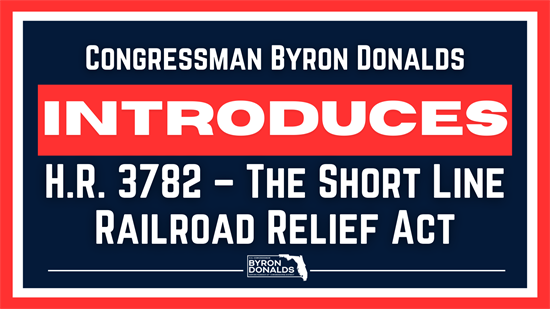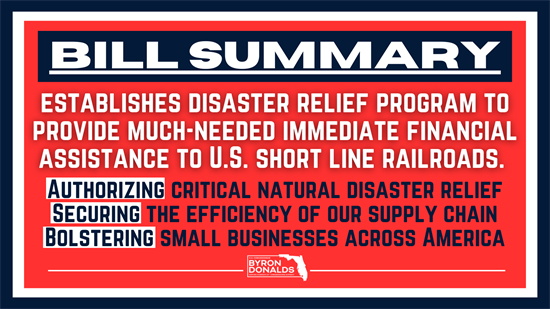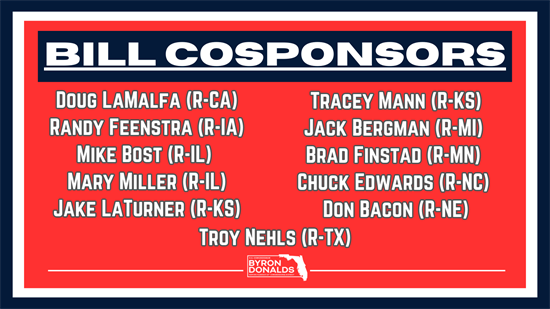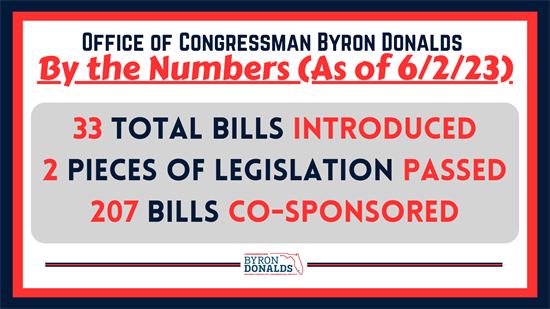| |
| |
| Last week, House Republicans were called back to Washington to debate and subsequently vote on Speaker McCarthy and President Biden's debt ceiling deal. After hearing about what had been negotiated, I was a no on this deal, but after reading the deal in its entirety, I was absolutely a no. Unfortunately, Washington did it again. While you were celebrating Memorial Day, this town was cutting another terrible deal that's going to put us in more debt. The disastrous debt ceiling deal included no cap in raising the debt $4 trillion, while only cutting $12 billion. It also kept Biden's baseline spending intact for federal agencies, canonized post-COVID overspending and does nothing to eliminate Green New Deal policies that were implemented under the previous Congress. These provisions do not reflect the priorities or best interests of the American people. I called on my Republican colleagues to vote against this deal. I warned my colleagues that their constituents will ask them why they voted to keep all of Biden's policies intact, while all they did was vote to raise the debt ceiling. I told them to stand up and demand renegotiation. 70 of my colleagues joined this cause for fiscal responsibility. The reality is that we must curtail baseline spending in our country. We have to do this so we can have the opportunity to at least stabilize our debt position and in some respect, begin to pay down our trillions of dollars in debt. This deal did not do that. Unfortunately, the debt ceiling deal passed the House of Representatives with the support of 165 Democrats and only 149 Republicans. The fact that Biden White House talking points on this deal were very positive all week, should have been enough for our conference to realize that this deal was not serious about cutting down our debt. If we were going to keep all of Biden's overspending anyway, we should have at least tried to do something constructive like adding border security provisions. Moving forward, our federal government must rein in spending and go back to pre-COVID spending levels. If we started paying down our debt today, it could take at least fifteen years to get closer to a balanced budget. The level of cuts & austerity measures that we will need to take, will only get more serious with inaction. Who this really hurts are the American people, who didn't ask for this reckless Democratic overspending. Furthermore, I introduced my thirty-third bill of the 118th Congress, the Short Line Rail Road Relief Act. This bill, which received the support of eleven Congressional cosponsors from coast to coast, authorizes the establishment of a disaster relief program to provide much-needed immediate financial assistance to our nation's short line railroads. Just months ago, Hurricane Ian made landfall in Southwest Florida, causing historic devastation in our community. Among one of the hardest hit entities in Southwest Florida was the Seminole Gulf Railway–which incurred catastrophic damage. When a storm of this magnitude hits any area of our nation, it is the federal government's responsibility to make available the necessary resources to rebuild and restore vital components of a community. As Hurricane Season 2023 begins, it is imperative that we establish a means in which America's short line railroads can receive critical relief in the event of natural disasters. As your Congressman, you have my commitment to work on your behalf and restore order and proper governance to The People's House.
|
| |
| Donalds Reintroduces Legislation To Secure Disaster Relief For Short Line Railroads As Hurricane Season 2023 Begins WASHINGTON - Representative Byron Donalds (R-FL) reintroduced H.R. 3782 - The Short Line Railroad Relief Act alongside Representatives Doug LaMalfa (R-CA), Randy Feenstra (R-IA), Mike Bost (R-IL), Mary Miller (R-IL), Jake LaTurner (R-KS), Tracey Mann (R-KS), Jack Bergman (R-MI), Brad Finstad (R-MN), Chuck Edwards (R-NC), Don Bacon (R-NE) and Troy Nehls (R-TX). This legislation authorizes the establishment of a disaster relief program to provide much-needed immediate financial assistance to our nation's short line railroads. "Just months ago, Hurricane Ian made landfall in Southwest Florida, causing historic devastation in our community," said Congressman Byron Donalds. "Among one of the hardest hit entities in Southwest Florida was the Seminole Gulf Railway–which incurred catastrophic damage. When a storm of this magnitude hits any area of our nation, it is the federal government's responsibility to make available the necessary resources to rebuild and restore vital components of a community. As Hurricane Season 2023 begins, it is imperative that we establish a means in which America's short line railroads can receive critical relief in the event of natural disasters." "Short line railroads are responsible for transporting a variety of goods across the country, and without support from Congress, many are forced to close shop after a natural disaster because of inadequate federal relief," said Railroads, Pipelines, and Hazardous Materials Subcommittee Chairman Troy E. Nehls. "These small businesses must receive the support they need to stay afloat and keep our country moving after a natural disaster. I am proud to join my colleague, Congressman Byron Donalds, to provide much-needed relief for our nation's short line railroads." "Americans have come to realize just how fragile our supply chains are. Short line railroads help save small businesses money and keep our supply chain moving," said Congressman Mike Bost. "But when disaster unfortunately strikes, federal programs have failed to provide timely assistance to affected businesses. I'm proud to support the Short Live Railroad Relief Act to establish a permanent disaster relief program for short line railroads and protect our supply chain." "The past couple years have demonstrated how devastating supply chain interruptions can be," said Congressman Don Bacon. "I support the Short Line Railroad Relief Act to ensure that short line railroads, which primarily support small businesses and local economies, are protected in the case of natural disasters. We need to keep goods and services moving!" "In the event of a natural disaster, short line railroads can play a critical recovery role, moving relief goods in and debris of all kinds out, yet no significant federal disaster relief options are available to them beyond small loans," stated Chuck Baker, President, American Short Line and Regional Railroad Association. "The Short Line Railroad Relief Act would provide parity across transportation modes, allowing for immediate deployment of grant funding to short line railroads, enabling them to turn their attention to rebuilding the local economy, particularly crucial in the small town and rural communities that we serve. Representative Donalds was spurred into action by the devastation to the Seminole Gulf Railway in his district, caused by Hurricane Ian last year. The concern however is applicable nationwide, resulting in Congressional support throughout the country for this effort. We applaud each of the cosponsoring members of Congress for their leadership." Background: The United States is home to more than 600 small business, short line freight railroads, that play a vital role in transporting materials from various economic sectors including: industrial manufacturing, agriculture, energy, chemicals, minerals, metals, timber, etc. Only a handful of short line railroads are government-owned, none are publicly traded and most short line railroads are private, small businesses. Without short line railroads, freight would generally be diverted to highways—which could cost shippers up to four to six times more per shipment, or production would shift to other areas/industries. Any short line railroad closure would, over the course of one year, add thousands of additional semi-trucks on our nation's roads & highways. Currently, federal programs fail to provide short line railroads with immediate financial relief after natural disasters. Commercial insurance for short lines is also often unavailable, doesn't provide adequate coverage following a natural disaster, or is unaffordable at a viable rate for small businesses. Short line railroads are generally one natural disaster away from being forced to close shop, which would ultimately result in gaping holes and negative impacts throughout our country's volatile supply chain. The Short Line Railroad Relief Act is the thirty-third bill introduced by Rep. Donalds during the 118th Congress and addresses this urgent concern by authorizing the establishment of a disaster relief program for American short line railroads. The program will be headed by the Secretary of Transportation in consultation with the Federal Railroad Administrator. |
 |
| |
 |
| |
 |
| |
 |







